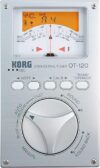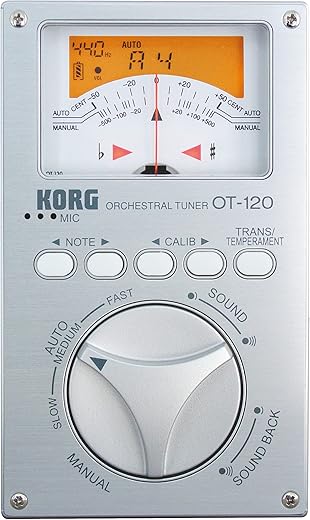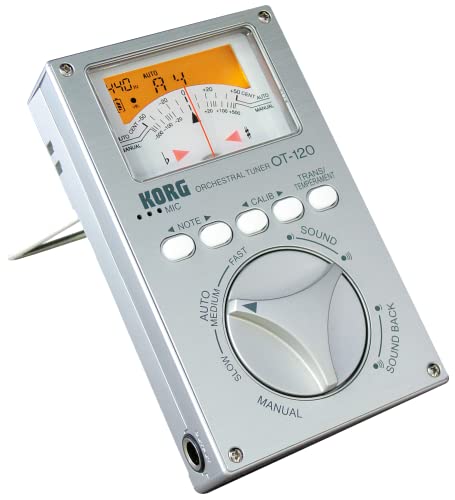
Original price was: €79.68.€68.94Current price is: €68.94.
Korg OT-120 Orchestral Tuner Price comparison
Korg OT-120 Orchestral Tuner Price History
Korg OT-120 Orchestral Tuner Description
Korg OT-120 Orchestral Tuner: The Perfect Companion for Musicians
The Korg OT-120 Orchestral Tuner is an essential tool for musicians seeking precision and reliability. Designed to make tuning instruments efficient and effortless, this tuner is ideal for orchestras, ensembles, or solo performers looking to maintain perfect pitch. Whether you’re tuning strings, winds, or percussion instruments, the Korg OT-120 delivers exceptional performance. Discover the advantages of this versatile tuner and find out why it stands out in the crowded market.
Key Features of the Korg OT-120 Orchestral Tuner
- Lightweight and Portable: Weighing just 13.6 ounces, the OT-120 is easy to carry, making it perfect for musicians on the go.
- Durable Aluminum Body: Constructed from polished aluminum, this tuner is built to withstand regular use while maintaining a sleek look.
- Easy-to-Read Display: Featuring a 2″ standing screen display, users can quickly see tuning information, even in low-light settings.
- Comes Ready to Use: The tuner operates on 2 AA alkaline batteries, which are included with your purchase for immediate use.
- Versatile Tuning Options: The OT-120 supports a variety of scales and instruments, making it adaptable to different musical needs.
- Manufacturer Reliability: Korg USA Inc. is a trusted name in musical equipment, providing quality products since 1962.
Price Comparisons Across Suppliers
When searching for the best price for the Korg OT-120 Orchestral Tuner, you’ll find a variety of options across different suppliers. On average, prices range from $49.99 to $69.99. This is a reasonable investment considering the tuner’s robust features and reliable performance. You can also take advantage of seasonal discounts or promotional offers, which may include free shipping or bundled accessories.
Insights from the 6-Month Price History
The 6-month price history chart indicates that the Korg OT-120 maintains stable pricing with occasional dips during holiday sales. Notably, the price peaked in the summer months, likely due to increased demand from musicians preparing for performance seasons. Keeping an eye on these trends can help you make an informed purchasing decision.
Customer Reviews: What Musicians Are Saying
Customers rave about the Korg OT-120 Orchestral Tuner for its accuracy and user-friendly interface. Positive reviews frequently highlight the following:
- Accuracy: Many users appreciate the tuner’s ability to detect subtle pitch variations, making it a favorite among professional musicians.
- Portability: Musicians enjoy its lightweight design, which allows them to easily carry it to rehearsals and performances.
- Battery Life: Users note that the included AA batteries last a long time, even with regular use.
On the flip side, some customers mention minor drawbacks, such as:
- Lack of additional connectors: Some users wish for Bluetooth or USB connectivity for interfacing with other devices.
- Limited advanced features: While the OT-120 is perfect for basic tuning, advanced musicians may find it lacking in complex features available in higher-end models.
Explore Unboxing and Review Videos
For a more in-depth understanding of the Korg OT-120 Orchestral Tuner, check out various unboxing and review videos available on YouTube. These videos highlight the tuner’s setup process, key features, and real-world functionality, offering a comprehensive overview of how it performs during practice and performance settings. Watching these can provide additional insights that help you decide if this tuner is right for you.
In Conclusion
The Korg OT-120 Orchestral Tuner is an invaluable tool for any musician who values precision and ease of use. With its compact design, durable construction, and clear display, it stands out as a top choice in the market. Whether you’re a beginner or a seasoned pro, the Korg OT-120 ensures you’ll always be in tune. Ready to elevate your musical experience? Compare prices now!
Korg OT-120 Orchestral Tuner Specification
Specification: Korg OT-120 Orchestral Tuner
|
Korg OT-120 Orchestral Tuner Reviews (11)
11 reviews for Korg OT-120 Orchestral Tuner
Only logged in customers who have purchased this product may leave a review.









H. Martin –
As an absolute self taught beginner, I have found this instrument to be valuable and easy to use. I don’t even play a piano, but my two sons and wife do. It costs over $200 per visit to get a tuner out to our rural location and I think there is only one tuner in town. Our upright piano requires constant tuning, and so I decided to roll up my sleeves and give it a shot, after all, if someone else can learn how to do it, so can I.
Researching the Internet and Amazon, I found the tools and reference materials to make an educated decision on what to buy. I selected this instrument along with a book, “Piano Servicing, Tuning, and Rebuilding: For the Professional, the Student,…” and tools to make the necessary adjustments. Within an hour of receiving all the tools, I re-tuned four badly out of tune keys. The wife and kids were impressed and the tools paid for themselves after the first attempt. With the help of the book and the Korg OT-120, I should get better at it over time. even my 12 year old son understood what was going on as he watched me (his dad) adjust the piano strings back into the correct sounding notes.
I haven’t used the Korg enough yet to give a detailed review, but I just know when I set the dial for “Manual” and watched the meter needle swing to the center, I was getting the results my family was hoping for.
The Korg comes with a very nice storage case and I did pay the extra money to get the plug in microphone. Maybe when I get better at it, I’ll come back and give a better review. I just know this instrument works as expected and gets results.
Lestchiner mchel –
Arrivé très vite et plus précis qu’une appli!
oscar –
Un exelente producto en mi caso lo uso para mis guitarras electricas y la verdad es muy util para afinar y para octavar la guitarra por locque es muy bueno que tenga una aguja analogica. En cuanto a su construccion es de plastico y solo la caratula de alumunio pero se ve de buena calidad y viene con un estuche muy bonito para guardarlo el cual lo protege muy bienaparte de la señalizacion por aguja tiene su pantalla digital y la cual puedes encender en luz naranja pars una mejor visibilidad con poca luz.
En cuestion de alimentacion lo puedes hacer con un eliminador de 9 volts o con pilas AAA , NO VIENE CON ELIMINADOR SOLO TRAE BATERIAS. Yo lo uso con baterias recargables y funciona bien.
Lo unico pari mi que no me gusto fue el boton de encendido el cual es de plastico pero se ve muy sencillo y no se sinte de muy buen calidad. POR ULTIMO YO SIN DUDAR RECOMIENDO QUE LO COMPREN CREO QUE VALE LA PENA. ESTOY MUY AGUSTO CON EL AFINADOR
Mike –
Tuner is terrific. I have the older version of the Korg orchestra tuner – and this is quite a bit better – range of tuning frequencies and the ability to work with all kinds of instruments.
Fred Murtz –
My Boss TU 12 tuner started to fail and this Korg OT 120 is a fantastic replacement. The tunings are very precise, and the tuner is easy to use. I do studio recording and precision tuning is essential. I love the analog meter. The digital display is a bit hard to read with the tuner standing, but very easy with it laying flat. Both mic and input tunings work well that way so the display is not an issue for me. I highly recommend this tuner.
Follow up to this review. I am so impressed with this tuner that I bought a backup for my recording studio. This is precision tuning.
R. Baugh –
I use this for tuning our church piano. The instructions on “how to use” could be better, but overall this is worth the money. For example, the meter offers “slow, medium, or fast” meter averaging, but no instructions when each might be best. I’ve found, generally, “slow” is needed for the bass notes, and the faster acquisition speeds are okay for higher notes. There also seems to be a slight discrepancy b/w when the LED’s indicate “center” for a note verses the meter needle, leaving the user to guess which is right. If you have a good ear (which if you really need this meter, you probably don’t), you can use the “tone” mode to discern the difference. Myself, I’ve found that as long as long as you’re consistent in HOW you read the meter, your piano will sound pretty good. If you have electronic instruments in your band, you may want to get a reading on those first (which may not be tunable), to see how they measure up. Then tune your string instruments to match on the meter.
Dr H –
I had an older Korg chromatic tuner that I used for years, which was made right on the cusp of the great change from analog to digital devices. I still do use it, despite a couple of broken switches, but it is kind of bulky, so I found myself shopping around for a new one.
I had pretty specific requirements: I wanted both digital readout and an analog meter. I needed to be able to “tweak” the pitch reference by cents, since I sometimes work with microtonal systems and temperments other than 12-tone equal temperment. I wanted something with an internal mike and speaker, for portability, but also with input so that I could attach an external clip-on mike.
The OT-120 pretty much fit the bill on all of these points. It includes a number of stock tuning systems built-in (12tet; meantone; Werkmeister etc.), but also allows you to create your own, as well as to alter any reference pitch by +/- 50-cents on the fly. There is a digital readout that supplies both the pitch in scientific notation (C4 = middle C), and the deviation, if any, in cents. There is also an analog meter that allows for some pretty fine gradations of pitch, and which centers when your pitch matches the reference pitch. The accuracy is quite good: in comparing results on this tuner to a strobe tuner, it seems to get within +/- 1 cent, on average; for a non-strobe tuner this is close to phenomenal.
There is also a sensitivity control which adjusts the response time to an external signal to one of three levels: fast, medium, or slow. This is very handy if you have a source that takes a while to “settle in” to its fundamental pitch, such as a long string with a low pitch. The “fast” mode is good for sounds that lock-in fairly quickly, such as wind instruments.
My one caveat with this tuner is that the case is far less well made than that of my old Korg tuner, which has seen a lot of hard use (and abuse) and is still in one piece and working. Although the OT-120 looks in some pictures as though it has a metal case, it’s really silver-grey plastic, with a thin aluminum front panel. And the plastic isn’t all that heavy-duty — a moderate squeeze with the fingers easily opens up the seam in the side, and I get the feeling that I could probably do permanent damage to the case simply by crushing it in my hand. This is unfortunate given the circumstances in which this device is most likely to be used. One could easily imagine that a few falls from a music stand to the stage floor might kill this tuner — and I seriously doubt it will last as long as my old one. This is the only thing that cost the tuner a star.
Would have been nice if an AC power supply and external mike were included, but these were easily obtained as add-on accessories.
That said, these tuners have come down considerably in price — almost 50% from what they were selling for a year or two ago, so the cost savings does mitigate the flimsy case construction, somewhat. Still, I’d have happily paid $20 more to get an actual metal case, our at least double thickness on the current plastic case.
There are a lot of instrument-specific tuners, with far fewer features out there, which may be more durable. But if you need to tune a lot of different kinds of instrument (as I do), or if you need to be able to design your own tuning tweaks (A=445, instead of 440, for example), Then this is definitely the most versatile tuner available for the price. Even with the light-weight case, I’d certainly buy another of these.
Greg B –
I had a cheaper model tuner for tuning my guitar but it was always a struggle to get it to “hear” the note and the results were spotty. Not so with this tuner, it works great, picks up the note much better than my cheaper unit and allows me to tune my guitars quickly and easily. Plus it looks much cooler than my old tuner so I can leave it out on the desk. Definitely recommended!
Benoît Meulle-Stef –
Vraie accordeur professionnel
Greywolf –
I make and play ancient and Medieval musical instruments. Having recently made a recreation of a 3-stringed lute called a Timpan, mentioned in Irish and Welsh texts from the 9th to the 16th century, I wanted to tune it using the Pythagorean mode that was common across Europe during the 12th century heyday of the Timpan. Ditto with a couple of lyres, an Iranian setar and the horse-hair-strung harp that’s my next project.
It took some searching, but eventually I tracked down this neat little beasty from Korg, a company with a long and noble tradition of making quality electronic kit for musicians. The OT 120 did not disappoint. Having slotted in the provided batteries, a brief look at the instruction leaflet told me what buttons to push and lo, it’s now set to Pythagorean tuning mode. Yay! It has excellent sensitivity, its internal mic easily picking up notes played close to it and providing good, clear feedback as strings are adjusted.
The stand on the back seems a little flimsy. It works well so far, but I’ll have to be careful with it. This is made easier by the nicely robust protective carrying case that comes with the tuner. This even has a strap for if you feel like hooking it to your belt. I probably won’t, but it’s a nice thought.
It’s much bigger than the average electronic tuner tends to be, but then it does more, being adjustable to a variety of tuning modes. Honestly, I’m delighted to have found a Pythagorean electronic tuner at all. It did take some searching. So, a really, really useful piece of kit for early musicians and kudos to Korg for producing it.
Cliente Amazon –
Si lo que quieres es un aunque sencillo para el día a día, con culaquier app o afinador barato te valdrá de sobra, pero si quieres darte el gustazo de un afinador excepcional, no te arrepentirás. Puedes escoger entre muchos sistemas de afinación, distintas velocidades de medición y, una de sus grandes opciones, usas pinza (no incluida) tiene un modo en que te devuelve por el altavoz la nota afinada (en el sistema elegido) más cercana a la que estás emitiendo; una idea muy buena para trabajar afinación de desarrollando el oído (y no la vista). Caro pero a mí me ha comprobado el capricho.
Por cierto, tiene buen acabado, una funda sencilla, luz en la pantalla…